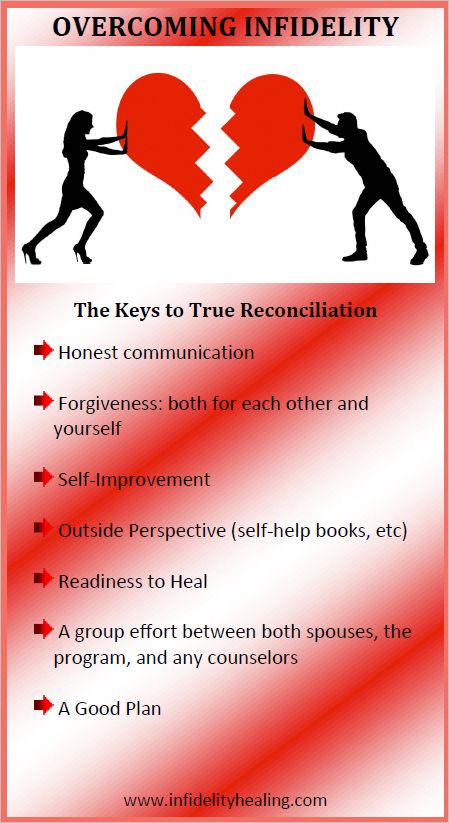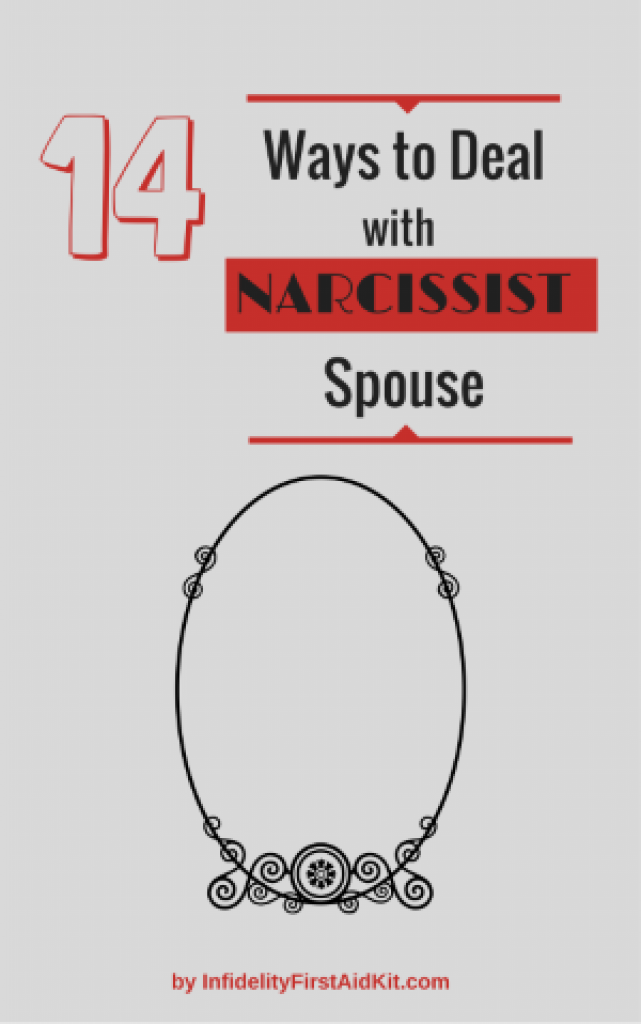Narcissistic husband infidelity
Why Narcissists Have Affairs And Cheat On Their Spouses
Narcissists cheat on their spouses, commit adultery and have extramarital affairs and liaisons for a variety of reasons which reflect disparate psychodynamic processes.
The Psychodynamic Process Enables Cheating
- In the quest for narcissistic supply, the somatic narcissist resorts to serial sexual conquests.
- Narcissists are easily bored (they have a low boredom threshold) and they have a low tolerance for boredom. Sexual dalliances alleviate this nagging and frustrating ennui.
- Narcissists maintain an island and focus of stability in their life, but all the other dimensions of their existence are chaotic, unstable, and unpredictable. This “twister” formation serves many emotional needs which I expound upon
elsewhere. Thus, a narcissist may be a model employee and pursue a career path over decades even as he cheats on his wife and fritters their savings away.
- Narcissists feel superior and important and so entitled to be above the law and to engage in behaviors that are frowned upon and considered socially unacceptable in others.They reject and vehemently resent all limitations and conditions placed upon them by their partners. They act on their impulses and desires unencumbered by social conventions and strictures.
- Marriage, monogamy, and child-bearing and rearing are common activities that characterize the average person.The narcissist feels robbed of his uniqueness by these pursuits and coerced into the relationship and into roles – such as a husband and a father – that reduce him to the lowest of common denominators.This narcissistic injury leads him to rebel and reassert his superiority and specialness by maintaining extramarital affairs.
- Narcissists are control freaks. Having a relationship implies a give-and-take and a train of compromises which the narcissist acutely interprets to mean a loss of control over his life.
 To reassert control, the narcissist initiates other relationships in which he dictates the terms of engagement (love affairs).
To reassert control, the narcissist initiates other relationships in which he dictates the terms of engagement (love affairs). - Narcissists are terrified of intimacy. Their behavior is best characterized as an approach-avoidance repetition complex. Adultery is an excellent tool in the attempt to retard intimacy and resort to a less threatening mode of interaction.
Somatic & Cerebral Narcissists
Broadly speaking, there are two types of narcissists, loosely corresponding to the two categories mentioned in the question:
- Somatic Narcissist
- Cerebral Narcissist
Narcissists are misogynists. They hold women in contempt, they loathe and fear them. They seek to torment and frustrate them (either by debasing them sexually – or by withholding sex from them). They harbor ambiguous feelings towards the sexual act.
Sex And The Narcissist
The somatic narcissist uses sex to “conquer” and “secure” new sources of narcissistic supply. Consequently, the somatic rarely gets emotionally-involved with his “targets”.
Consequently, the somatic rarely gets emotionally-involved with his “targets”.
His is a mechanical act, devoid of intimacy and commitment. The cerebral narcissist feels that sex is demeaning and degrading. Acting on one’s sex drive is a primitive, basic, and common impulse.
The cerebral narcissist convinces himself that he is above all that, endowed as he is with superior intelligence and superhuman self-control.
Still, sex for both types of narcissists is an instrument designed to increase the number of Sources of Narcissistic Supply.
If it happens to be the most efficient weapon in the narcissist’s arsenal, he makes profligate use of it.
In other words: if the narcissist cannot obtain adoration, admiration, approval, applause, or any other kind of attention by other means (e.g., intellectually) – he resorts to sex.
The Beginnings Of Cheating
He then becomes a satyr (or a nymphomaniac): indiscriminately engages in sex with multiple partners. His sex partners are considered by him to be objects – sources of Narcissistic Supply.
His sex partners are considered by him to be objects – sources of Narcissistic Supply.
It is through the processes of successful seduction and sexual conquest that the narcissist derives his badly needed narcissistic “fix”.
The narcissist is likely to perfect his techniques of courting and regard his sexual exploits as a form of art.
He usually exposes this side of him – in great detail – to others, to an audience, expecting to win their approval and admiration.
The Act of Conquest Leads to Partner Hopping
Because the Narcissistic Supply in his case is in the very act of conquest and (what he perceives to be) subordination – the narcissist is forced to hop from one partner to another.
Some narcissists prefer “complicated” situations. If men – they prefer virgins, married women, frigid or lesbian women, etc.
The more “difficult” the target – the more rewarding the narcissistic outcome.
Rationalizing Behavior
Such a narcissist may be married, but he does not regard his extra-marital affairs as either immoral or a breach of any explicit or implicit contract between him and his spouse.
He keeps explaining to anyone who cares to listen that his other sexual partners are nothing to him, meaningless, that he is merely taking advantage of them and that they do not constitute a threat and should not be taken seriously by his spouse.
In his mind a clear separation exists between the honest “woman of his life (really, a saint) and the whores that he is having sex with.
With the exception of the meaningful women in his life, he tends to view all females in a bad light.
His behavior, thus, achieves a dual purpose: securing Narcissistic Supply, on the one hand – and re-enacting old, unresolved conflicts and traumas (abandonment by Primary Objects and the Oedipal conflict, for instance).
Finding the right care
can be difficult.
We make it easier.
Get Help Today
How Narcissists React To Abandonment
When inevitably abandoned by his spouse – the narcissist is veritably shocked and hurt. This is the sort of crisis, which might drive him to psychotherapy. Still, deep inside, he feels compelled to continue to pursue precisely the same path.
Still, deep inside, he feels compelled to continue to pursue precisely the same path.
Depression and Anger
His abandonment is cathartic, purifying. Following a period of deep depression and suicidal ideation – the narcissist is likely to feel cleansed, invigorated, unshackled, ready for the next round of hunting.
RELATED ARTICLE: Alphabetical List Of Mental Disorders
But there is another type of narcissist.
He also has bouts of sexual hyperactivity in which he trades sexual partners and tends to regard them as objects. However, with him, this is a secondary behavior. It appears mainly after major narcissistic traumas and crises.
A painful divorce, a devastating personal financial upheaval – and this type of narcissist adopts the view that the “old” (intellectual) solutions do not work anymore.
He frantically gropes and searches for new ways to attract attention, to restore his False Ego (=his grandiosity) and to secure a subsistence level of Narcissistic Supply.
Sex is handy and is a great source of the right kind of supply: it is immediate, sexual partners are interchangeable, the solution is comprehensive (it encompasses all the aspects of the narcissist’s being), natural, highly charged, adventurous, and pleasurable.
Thus, following a life crisis, the cerebral narcissist is likely to be deeply involved in sexual activities – very frequently and almost to the exclusion of all other matters.
Recovery and Isolation from Other Women
However, as the memories of the crisis fade, as the narcissistic wounds heal, as the Narcissistic Cycle re-commences and the balance is restored – this second type of narcissist reveals his true colours.
He abruptly loses interest in sex and in all his sexual partners. The frequency of his sexual activities deteriorates from a few times a day – to a few times a year. He reverts to intellectual pursuits, sports, politics, voluntary activities – anything but sex.
This kind of narcissist is afraid of encounters with the opposite sex and is even more afraid of emotional involvement or commitment that he fancies himself prone to develop following a sexual encounter.
In general, such a narcissist withdraws not only sexually – but also emotionally. If married – he loses all overt interest in his spouse, sexual or otherwise.
He confines himself to his world and makes sure that he is sufficiently busy to preclude any interaction with his nearest (and supposedly dearest).
He becomes completely immersed in “big projects”, lifelong plans, a vision, or a cause – all very rewarding narcissistically and all very demanding and time consuming. In such circumstances, sex inevitably becomes an obligation, a necessity, or a maintenance chore reluctantly undertaken to preserve his sources of supply (his family or household).
The cerebral narcissist does not enjoy sex and by far prefers masturbation or “objective”, emotionless sex, like going to prostitutes.
Actually, he uses his mate or spouse as an “alibi”, a shield against the attentions of other women, an insurance policy which preserves his virile image while making it socially and morally commendable for him to avoid any intimate or sexual contact with others.
Ostentatiously ignoring women other than his wife (a form of aggression) he feels righteous in saying: “I am a faithful husband”.
At the same time, he feels hostility towards his spouse for ostensibly preventing him from freely expressing his sexuality, for isolating him from carnal pleasures.
The narcissist’s thwarted logic goes something like this: “I am married/attached to this woman. Therefore, I am not allowed to be in any form of contact with other women which might be interpreted as more than casual or businesslike.
This is why I refrain from having anything to do with women – because I am being faithful, as opposed to most other immoral men.
However, I do not like this situation. I envy my free peers. They can have as much sex and romance as they want to – while I am confined to this marriage, chained by my wife, my freedom curbed. I am angry at her and I will punish her by abstaining from having sex with her.”
Thus frustrated, the narcissist minimizes all manner of intercourse with his close circle (spouse, children, parents, siblings, very intimate friends): sexual, verbal, or emotional. He limits himself to the rawest exchanges of information and isolates himself socially.
He limits himself to the rawest exchanges of information and isolates himself socially.
His reclusion insures against a future hurt and avoids the intimacy that he so dreads. But, again, this way he also secures abandonment and the replay of old, unresolved, conflicts. Finally, he really is left alone by everyone, with no Secondary Sources of Supply.
The Cycle Begins Again
In his quest to find new sources, he again embarks on ego-mending bouts of sex, followed by the selection of a spouse or a mate (a Secondary Narcissistic Supply Source). Then the cycle re-commence: a sharp drop in sexual activity, emotional absence and cruel detachment leading to abandonment.
The second type of narcissist is mostly sexually loyal to his spouse. He alternates between what appears to be hyper-sexuality and asexuality (really, forcefully repressed sexuality).
In the second phase, he feels no sexual urges, bar the most basic. He is, therefore, not compelled to “cheat” upon his mate, betray her, or violate the marital vows.
He is much more interested in preventing a worrisome dwindling of the kind of Narcissistic Supply that really matters. Sex, he says to himself, contentedly, is for those who can do no better.
Somatic narcissists tend to verbal exhibitionism. They tend to brag in graphic details about their conquests and exploits.
In extreme cases, they might introduce “live witnesses” and revert to total, classical exhibitionism. This sits well with their tendency to “objectify” their sexual partners, to engage in emotionally-neutral sex (group sex, for instance) and to indulge in autoerotic sex.
The exhibitionist sees himself reflected in the eyes of the beholders. This constitutes the main sexual stimulus, this is what turns him on. This outside “look” is also what defines the narcissist.
There is bound to be a connection. One (the exhibitionist) may be the culmination, the “pure case” of the other (the narcissist).
Sin of self-love possesseth all mine eye
And all my soul and all my every part;
And for this sin there is no remedy,
It is so grounded inward in my heart.
Methinks no face so gracious is as mine,
No shape so true, no truth of such account;
And for myself mine own worth do define,
As I all other in all worths surmount.
But when my glass shows me myself indeed,
Beated and chopp’d with tann’d antiquity,
Mine own self-love quite contrary I read;
Self so self-loving were iniquity.
‘Tis thee, myself, that for myself I praise,
Painting my age with beauty of thy days.
(Sonnet 62, William Shakespeare)
7 Narcissistic Cheating Patterns & How to Handle Them
Skip to contentPublished: October 26, 2022 Updated: November 9, 2022
Published: 10/26/2022 Updated: 11/09/2022
Not all narcissists are cheaters, but rates of infidelity are higher among them, which may concern people who are in a relationship with a narcissist. Your partner may show less interest in you, signs of inappropriate online behavior, flirt with others in front of you, and become defensive when you question them. Learning about narcissists cheating patterns may help clarify your suspicions and find ways to address the infidelity.
Learning about narcissists cheating patterns may help clarify your suspicions and find ways to address the infidelity.
Being in a relationship with a narcissist can be emotionally draining and exhausting. Therapy can help you deal with the negative emotions that stem from a partner’s cheating behaviors and patterns. BetterHelp has over 20,000 licensed therapists who provide convenient and affordable online therapy. BetterHelp starts at $60 per week. Complete a brief questionnaire and get matched with the right therapist for you.
Choosing Therapy partners with leading mental health companies and is compensated for referrals by BetterHelp
Visit BetterHelp
What is a Narcissist?
In essence a narcissist refers to someone who is self-involved, needs constant attention, and lacks empathy. Many people can have narcissistic traits, but when these traits are persisting and unchangeable, it may meet the criteria for a narcissistic personality disorder (NPD) diagnosis. The two subtypes of NPD are covert/vulnerable narcissism and grandiose narcissism. Moreover, it is believed that narcissists alternate between both depending on the situation or life circumstances.1, 2, 3, 4, 5
The two subtypes of NPD are covert/vulnerable narcissism and grandiose narcissism. Moreover, it is believed that narcissists alternate between both depending on the situation or life circumstances.1, 2, 3, 4, 5
There are two main subcategories of NPD, which are:
- Covert or vulnerable narcissism: Vulnerable or covert narcissists may be more insecure and vulnerable, making them more difficult to identify
- Grandiose narcissism: People with this subtype exhibit a feeling of superiority and may be what most people imagine narcissism looks like
Why Are Narcissists More Prone to Cheat?
Not all narcissists cheat, but rates of infidelity are higher among them. Unlike conventional cheaters, narcissistic cheaters can feel greater self-entitlement, impulsivity, suffer from control issues, and experience a lack of empathy and remorse. Furthermore, narcissists are pleasure-seeking by nature and may constantly look for new sources of narcissistic supply, which makes adulterous acts and serial cheating more likely to occur. 6
6
7 Narcissistic Cheating Patterns
Although not all narcissists are cheaters, there is still a high probability that they will cheat. It is also likely that the cheating narcissist has developed a set of tactics to enable their deceitful behavior. Thus, identifying these patterns sooner rather than later can potentially shield you from additional hurt and preserve your overall well being.
While every relationship is different, below are seven signs of narcissistic cheating:
1. Lying
Dishonesty, lying, and secrecy are almost always present in any form of infidelity, and narcissists are masters of deceit. Your narcissistic partner likely used their charming persona to draw you in, but they know this façade can fall apart at any given moment. To prevent this, they’ll lie about everything, even the tiniest things that, in their eyes, could taint the “perfect” image they’ve created. So, if you notice that your narcissist partner is lying about trivial stuff, chances are they are lying about bigger things too, such as infidelity. 5, 7
5, 7
2. Defensiveness
Don’t expect admission of wrongdoing when questioning a narcissist about cheating. In fact, they may take offense to it, turn the blame on you, claim you drove them to cheat, gaslight you, or flat out deny it. Narcissists dread losing control and having their conduct come into question, which is why defensiveness is common. It can also help prevent any type of narcissistic injury. Their defensiveness in and of itself is undoubtedly the most compounding confirmation that cheating is going on.6, 8 ,9
When a narcissist is cheating, they will think you are too, or may flip the script to make it seem that way. Your narcissist counterpart almost certainly has a distorted notion that showing a strong aversion towards infidelity won’t make you suspicious of them. They will typically do this while targeting you with accusations, harassment, and harsh judgements of suspected infidelity. Unfortunately, this common narcissist tactic can put you at a disadvantage because instead of confronting your narcissist’s adulterous acts, you now have to defend yourself. 5, 6, 8
5, 6, 8
3. Lack of Reassurance
Not only are narcissists defensive–they’re also not very reassuring. Your narcissist partner is often so self-involved that they are unable to separate themselves from their ego, thus deflecting or minimizing your suspicions. It is highly unlikely that they’ll ever validate your concerns about the possible infidelity or feel any guilt about it. The narcissist will disregard any requests for reassurance, which will often leave you feeling more confused and more suspicious.6
4. Requesting Space
When you first start a relationship with a narcissist, you’ll often encounter love bombing and get showered with extreme attention, affection, and love. Yet, because narcissists tend to get bored and lose interest quickly, this phase is often short-lived. You may notice your narcissist partner, particularly the grandiose type, pulling away and “needing space” in ways they previously have not. Generally, this signals that they’ve reached a limit with you and are now searching for new avenues of excitement in others. 6, 10
6, 10
5. Dubious Online Behavior
Narcissistic individuals have an ongoing need to self-promote and crave external validation. Therefore, social media can be the most gratifying outlet for them. It’s not uncommon for narcissists to spend excessive on-screen time. But if they start exhibiting shady social media use, like posting flirtatious comments on someone’s picture, oversharing personal details with people you’ve never met, and creating profiles on dating sites, it can further solidify your partner’s engagement in unfaithful acts.5, 6
6. More Spending
Narcissists, especially the grandiose type, tend to be flashy, since they usually have a distorted notion that their “sexual appeal” and desirability comes from displaying wealth and having material possessions. Thus, you may see your narcissistic partner making impulsive purchases and overspending on things like luxurious gadgets, a posh car, expensive clothes, and so forth. This behavior may be motivated by the challenge of successfully seducing the person/s they are trying to have an affair with. 6
6
7. Risky Sexual Behavior
Grandiose narcissism is strongly connected with a multitude of risky sexual behaviors, including having multiple sexual partners, frequent one-night stands, and higher rates of unprotected sex. Narcissists typically feel entitled to sexual pleasure in any way, shape, or form. Coupled with their impulsivity and openness towards sex and infidelity, it becomes a dangerous combination for everyone involved. That said, if you’re exclusive with a narcissist and get an STD, that may be direct confirmation that they are cheating on you while also putting your health at risk.6
Help For Narcissistic Abuse
Individual Therapy – Get personalized help with recovering from narcissistic abuse from a licensed therapist. BetterHelp offers online sessions by video or text. Try BetterHelp
Support Groups – You are not alone in dealing with a narcissist. Sesh offers over 100 different support groups per month, with at least once a week focused on narcissism. First Month Free
First Month Free
Books On Narcissism – See our handpicked selection of Narcissism Books List
Choosing Therapy partners with leading mental health companies and is compensated for referrals by BetterHelp and Sesh.
What to Do if You’re Dating a Cheating Narcissist
If you suspect your narcissist partner is cheating, explore your emotions and response options before confronting them. Keep in mind that they may employ tactics like gaslighting, denial, defensiveness, or even become abusive, so this encounter may not go well if you’re hoping to work things out. Nevertheless, openly addressing infidelity, regardless of the outcome, may shed light into issues within the relationship.
Some things to consider if you suspect your narcissistic partner has cheated include:
Process Your Emotions First
Before reacting, take a step back and allow yourself to feel the uncomfortable emotions the cheating can trigger. Although this might not be what you’d like to do initially, allowing yourself time to process your feelings and examining how you would like to address it can assist you in finding a constructive path forward.
Although this might not be what you’d like to do initially, allowing yourself time to process your feelings and examining how you would like to address it can assist you in finding a constructive path forward.
Plan your Approach
Having a plan may help you better manage your narcissist partner’s response, which may include defense mechanisms like gaslighting, projection, and verbal attacks, among others. When you’re ready, have a structured conversation in which you clearly convey your feelings, and only discuss the suspected or confirmed infidelity. Try to frame the talk around how this has impacted you, avoiding any personal attacks, which may be counterproductive in how your narcissist partner might react.
Rethink the Relationship
If your partner is not receptive to your feelings, unwilling to compromise, reacting violently/aggressively, and/or putting your health and well being at risk, it is time to go your separate ways. Before you do, make sure you take the necessary safety precautions, as many narcissists can become enraged and/or physically violent when their partners are the ones ending the relationship. 6, 9, 10
6, 9, 10
Consider Staying Together
Although narcissists tend to be less committed in long-term relationships, some can be strongly devoted when they feel highly satisfied with their partners. So, if you want to save your relationship, it may be possible. If your partner is equally invested in dealing with this crisis, couples’ counseling, individual therapy, and/or infidelity support groups may be helpful. Reaching out to these resources may not guarantee the outcome you hope for, but it can provide emotional support throughout.6
When to Consider Professional Help
If you are struggling after infidelity or are unsure how to proceed in your relationship, psychotherapy can assist you by providing a safe place to process strong emotions and encourage you to make healthy decisions regarding how you respond to their narcissistic relationship patterns and your personal wellbeing. Moreover, talk therapy can offer key moral support when dealing with infidelity and provide you with strategies to better cope with its effects. 10
10
Additionally, if the relationship is not abusive and you and your partner have decided to save your relationship after infidelity, couples counseling can be beneficial. Marriage and couples counseling can help you work through infidelity and begin to rebuild trust. Keep in mind that this is a process that requires intention, effort, and commitment. If you are both ready to find a marriage or couples counselor, an online therapist directory is a good place to start.
Final Thoughts
If you notice unusual behaviors in your narcissistic partner, even if it may not necessarily mean that they are cheating, it is still important that you discuss these concerns. Effective communication is key in a functioning, healthy relationship. However, If you find that your narcissistic partner is not willing to address your concerns, even if they are not cheating, and/or become abusive, you should reach out to a professional for support and guidance.
Additional Resources
Education is just the first step on our path to improved mental health and emotional wellness. To help our readers take the next step in their journey, Choosing Therapy has partnered with leaders in mental health and wellness. Choosing Therapy may be compensated for referrals by the companies mentioned below.
To help our readers take the next step in their journey, Choosing Therapy has partnered with leaders in mental health and wellness. Choosing Therapy may be compensated for referrals by the companies mentioned below.
BetterHelp (Online Therapy) – BetterHelp has over 20,000 licensed therapists who provide convenient and affordable online therapy. BetterHelp starts at $60 per week. Complete a brief questionnaire and get matched with the right therapist for you. Get Started
Online-Therapy.com – The Online-Therapy.com standard plan includes a weekly 45 minute video session, unlimited text messaging between sessions, and self-guided activities like journaling. Recently, they added Yoga videos. Get Started
Mindfulness.com (App) – Mindfulness and meditation can change your life. In a few minutes a day with Mindfulness.com, you can start developing mindfulness and meditation skills. Free Trial
Choosing Therapy’s Directory – Find an experienced therapist who is committed to your wellbeing. You can search for a therapist by specialty, availability, insurance, and affordability. Therapist profiles and introductory videos provide insight into the therapist’s personality so you find the right fit. Find a therapist today.
You can search for a therapist by specialty, availability, insurance, and affordability. Therapist profiles and introductory videos provide insight into the therapist’s personality so you find the right fit. Find a therapist today.
Choosing Therapy partners with leading mental health companies and is compensated for referrals by BetterHelp, Online-Therapy.com, and Mindfulness.com
10 sources
Choosing Therapy strives to provide our readers with mental health content that is accurate and actionable. We have high standards for what can be cited within our articles. Acceptable sources include government agencies, universities and colleges, scholarly journals, industry and professional associations, and other high-integrity sources of mental health journalism. Learn more by reviewing our full editorial policy.
-
American Psychiatric Association. (2022). Diagnostic And Statistical Manual Of Mental Disorders, Fifth Edition, Text Revision (5th ed.
 ). American Psychiatric Association Publishing.
). American Psychiatric Association Publishing. -
Caligor, E., Levy, K. N., & Yeomans, F. E. (2015). Narcissistic Personality Disorder: Diagnostic and Clinical Challenges. American Journal of Psychiatry, 172(5), 415–422. https://doi.org/10.1176/appi.ajp.2014.14060723
-
Dimaggio, G. (2021). Treatment principles for pathological narcissism and narcissistic personality disorder. Journal of Psychotherapy Integration. https://doi.org/10.1037/int0000263
-
Gabbard, G. O., & Crisp, H. (2018). Narcissism and its discontents: diagnostic dilemmas and treatment strategies with narcissistic patients. American Psychiatric Association Publishing.
-
Maass, V. S. (2019). Personality disorders : elements, history, examples, and research. Praeger, An Imprint Of Abc-Clio, Llc.
-
Hermann, Anthony D, et al. Handbook of Trait Narcissism : Key Advances, Research Methods, and Controversies.
 1st ed., Cham, Switzerland, Springer, 28 Sept. 2018.
1st ed., Cham, Switzerland, Springer, 28 Sept. 2018. -
O’Reilly, C. A., & Doerr, B. (2020). Conceit and deceit: Lying, cheating, and stealing among grandiose narcissists. Personality and Individual Differences, 154, 109627. https://doi.org/10.1016/j.paid.2019.109627
-
Hart, W., Adams, J., Burton, K. A., & Tortoriello, G. K. (2017). Narcissism and self-presentation: Profiling grandiose and vulnerable narcissists’ self-presentation tactic use. Personality and Individual Differences, 104, 48-57. https://doi.org/10.1016/j.paid.2016.06.062
-
Mason, P. T., & Kreger, R. (2020). STOP WALKING ON EGGSHELLS : Taking your life back when someone you care about has borderline a personality disorder. (3rd ed.). New Harbinger Publications, Inc.
-
Fox, D. (2018). Narcissistic personality disorder toolbox : 55 practical treatment techniques for clients, their partners & their children. Pesi Publishing.

If you are in need of immediate medical help:
Medical
Emergency
911
Suicide Hotline
800-273-8255
Treason and narcissism (He is a businessman, his wife and several mistresses) him. He provides for everyone, provides, sometimes all women know about each other and even communicate.
Some even argue: "Well, he's an alpha male and he can afford it, as nature intended."
Yes, if you look at it from the point of view of evolution, nature and alpha males, then everything is fine there, and for many there is another important argument: “If they live like this, then they like it, and look on Instagram they post happy photos to the envy of everyone ".
But let me tell you another picture of this "good" from the point of view of the leading accentuation in these men, and the main one is usually narcissistic.
(Character accentuation is the extreme variants of the norm, in which individual traits of character are hypertrophied and manifest themselves in the form of “weak points” in the individual’s psyche - its selective vulnerability to certain influences with good and even increased resistance to other influences).

How to distinguish a narcissist, what is most characteristic of him:
- The narcissist's personality is organized around maintaining self-respect by getting confirmation from outside and this overshadows everything else so that one can consider such a personality to be absorbed only by itself.
- Something is missing in the inner life of such clients - a deep feeling of lack ;
- Concerned about how they are perceived by other people. Have a deep feeling that they are deceived and unloved ;
- There is no sense of integrity and continuity of one's own "I", i.e. a disorder of one's own I am from grandiosity to inferiority .
- Every conceited and grandiose narcissist hides a self-conscious, shy child , and every depressed and self-critical narcissist hides a grandiose vision of who this person should or could be;
- a tendency to exhibition style behavior, overestimation of one's own merits, fantasies of omnipotence;
- alienation and emotional unavailability and feeling subjective blank ;
- an inner feeling of fear that they "do not fit" ;
- feeling shame a and weakness and low position;
- need external confirmation in order to feel internal conformity;
- a tendency to condemn others (expressing regret, contempt or criticizing them), which is most often based on envy , depending on their opinions.
- inner feeling of "emptiness" , because in childhood there was no reliance on themselves, on their feelings, and other significant people “knew” what they needed, internal supports of the significance and value of themselves were not formed inside, their values were always outside, not inside them.
How was the childhood , in which this alpha male - daffodil was formed.
His parents were preoccupied with work, prestige, fashion, success, achievements, results. How does the baby feel, what is happening to him, what is his mood - for this they were not there and they practically did not care.
For the formation of a healthy psyche, it is very important for a child to have emotional contact with adults, especially with mom and dad, their love, attention, support, their reflection, i.e. the parent is a mirror for the child in which he can be reflected and through this become aware of himself, understand himself, what is happening to him, what he is, what he does and feels. But if mom and dad are always busy with themselves, their achievements, prestige, then the child intuitively feels where the attention of adults is directed and tries to get their attention at any cost.
But if mom and dad are always busy with themselves, their achievements, prestige, then the child intuitively feels where the attention of adults is directed and tries to get their attention at any cost.
Often these parents' children become their narcissistic extension of . Those. they know where, how and what is “best” for their child. The feelings and desires of the child are devalued, and the desires of the parents are put at the forefront. For example, it is “prestigious” to play tennis in an environment, and parents begin to take the child to tennis, although he is absolutely not interested in him, he would be better off playing football, but no one asks the child’s opinion, no one is interested in what he wants.
His parents constantly produced “ranking” process , they and their child should have the best, while the real advantages and disadvantages could be completely ignored due to prestige concerns.
It is very important and sad that the child grows up as an object and not as a subject i. e. for his parents, his results, success, excellent grades are important, but the price of this, his feelings, state, desires is not important. For example, he goes to sports not because he likes it and wants it, but in order to get first place in the competition, and so that his father would say when he came home: “Well done!”. And when the guests arrived, the father could come up to the shelf with cups and proudly say: “My son won!”.
e. for his parents, his results, success, excellent grades are important, but the price of this, his feelings, state, desires is not important. For example, he goes to sports not because he likes it and wants it, but in order to get first place in the competition, and so that his father would say when he came home: “Well done!”. And when the guests arrived, the father could come up to the shelf with cups and proudly say: “My son won!”.
There was practically no love for the child, but he simply is, the way he is, they paid attention only to successes, and sometimes severely punished for failures, or they could remain silent for weeks and be ashamed of such a “loser” son.
Next to such parents it was impossible to say what one wanted, to declare one's desires, needs and leave them, because if you find hostile and selfish feelings, then this will immediately be followed by either punishment or rejection. It is not possible to be real, oneself, natural. You can only present to others a “person” (according to Jung), what is acceptable and approved by society, and everything that is not convenient goes into the “shadow”.
An atmosphere of evaluation reigned in the family, a child, in order to deserve the attention of his parents, must constantly be good, and even better ideal.
The son grew up for his parents, and not for his own sake. And this is also very important in the future, because. inside, the parents could not form the inner value, significance, growing up already as an adult, he all the time needs the approval of other people. Aspirations and achievements for praise and evaluation by other people, and not your true inner need.
The Power of the Narcissist: 9 Steps to Freedom
185,592
Man among peopleMan and woman
The feeling of love that we experience at the very beginning of a relationship with a narcissistic person is experienced much more strongly than in a healthy relationship. The reason is that a narcissist (male or female) floods us with declarations of love almost from the first days, does not tire of admiring, seeking advice, assuring that we are perfection itself, he or she met the best person in his life and is ready for us to all.
This is called "love bombing". Then the tactics change - the narcissist seems to retreat a little, his love confessions become less frequent, calmer, and finally the stormy ocean turns into a meager stream. It is a form of manipulation, control, and conditioning that the narcissist uses to keep us in his power.
There is no doubt that we loved. The only problem is that narcissists cannot love us back
When dealing with them, it is better to rely on your inner instinct, and not on the strength of your feelings. We tend to get so trapped in our feelings that we lose the ability to hear the alarm bells and red flags that come with a toxic relationship. Narcissists cannot keep a face for long - very soon their facade cracks. But they are masters of their craft and, if you are inexperienced, can easily put you on the hook.
1. Arm yourself with knowledge
The most important and first thing to do to get out of the trap is to learn as much as possible about what narcissistic personality disorder is, how narcissists work, their typical behavior and techniques.
You need to arm yourself with knowledge. Repeat and repeat over and over again. Until you study them properly, you won't be able to free yourself from their toxic hook - narcissists make us feel obligated by playing on our sense of duty, conscientiousness.
Feeling sorry for the narcissist when he or she has you trapped is pointless - they are just using your feelings against you. It is necessary to discard false pity in order to clearly see what you are dealing with.
2. Trust your intuition
Watch yourself — learn to separate feelings and deep inner feeling, intuition. Start trusting your intuition, not your feelings. Associating with a narcissist weakens physical, mental and emotional health because we are trying to understand a person whose behavior contradicts words.
Instead of listening to what they say, watch what they do. Words lie, actions reveal the truth. We really get to know people through their behavior. Words are just a breach of your trust.
You feel sick and exhausted because your mind and body tell you that you are in great danger, but everything seems to be fine (because he or she tells you so). Once again, trust your gut instinct. Become a cold-blooded explorer. Silently observe what is happening.
3. Don't put yourself in their shoes
Go back to where you belong. It's a matter of awareness. Mentally note how difficult it is to do this - these are the consequences of narcissistic processing.
Don't try to guess what they have in mind, imagine their next steps. Putting yourself in their place means trying to understand their motives, justify them, find a reasonable explanation for their behavior, and eventually get bogged down again in the poisonous swamp of their verbal manipulations.
When you catch yourself trying to "get into the narcissist's head," do your best to distract yourself. It's hard and it takes a lot of fortitude not to give in to the brainwashing they put on you to make sure they've taken over all the space inside your head.

4. Ignore messages
For the narcissist, information has no meaning, its only purpose is to suck you into the swamp of manipulation. The task is not to figure out whether to believe or not to believe the words of a narcissist. It is about breaking out of the vicious circle in which you think day and night only about what is connected with the narcissist.
Do not listen or pay attention to the content of the speeches that the narcissist makes. This is their way to take out your brain to draw you into their world and keep you where you always find yourself in the role of bad and guilty. They will keep pushing your boundaries and blowing the fuses that signal you are approaching the boundaries to constantly keep you on your toes, unbalance, disturb your peace.
Trying to find common sense in the speeches of a narcissist is to force your brain to work in a stressful mode, it gradually drives you crazy. Know that no matter what they say, narcissists are seeking some benefit for themselves, no matter how logical or beautiful their words sound.
Everything is only about them and for them, and the only desire of a narcissist is that you, too, be only about them and for them. They will do and say anything to keep you trapped in their little fantasy world. Once again: watch what they do (not say).
5. Protect your property and savings
If necessary, start saving money. Remember that they can completely bleed you. Protect everything that is of value to you. Acting from noble feelings and wanting to remain fair, you risk eventually being ruthlessly abandoned without a livelihood.
6. Silence is golden
When we love, we want to share our thoughts and feelings with the person we love — this is natural. But you do not have a loved one, you are dealing with a narcissist who pretends to be your soul mate.
Resist the temptation to tell them everything you think and feel
You can't move them.
They use your trust against you. The more open you are, the more guns and knives they have in your back. Narcissists love it when you share. If you have to say something, protect yourself as much as possible - don't tell the whole truth, be neutral, obscure or change the subject.
7. Who are you?
Deal with yourself, what you believe in, what is dearest to you in this world, what you want to live and die for. Otherwise, anyone can convince you of anything. Without knowing ourselves, we cannot set boundaries in a relationship - what we are ready to tolerate and what is categorically not. Strengthen your value system and protect what you hold dear. Then you will know what to do and how to behave, instead of hesitating and bending under the onslaught of someone else's will.
8. Be patient
Keep observing and analyzing. By learning the basic manipulative techniques of narcissists, you will be able to recognize them accurately.















